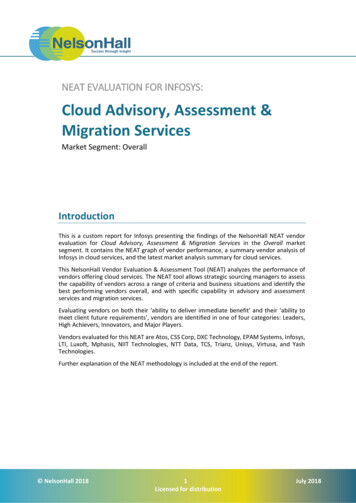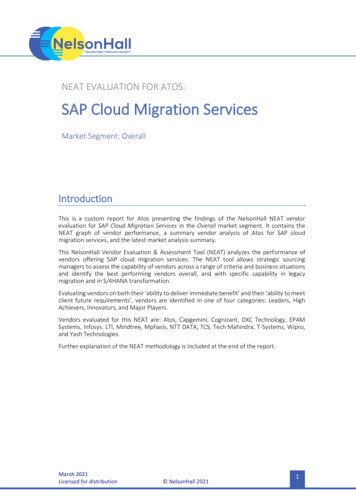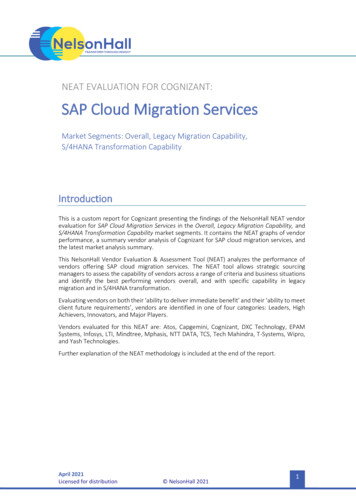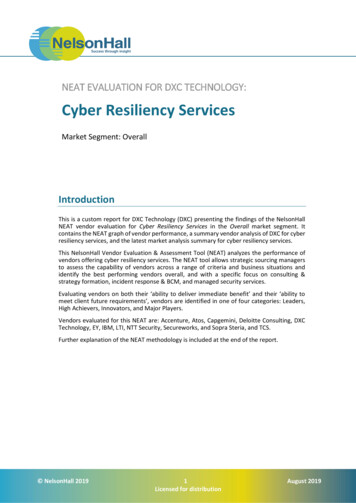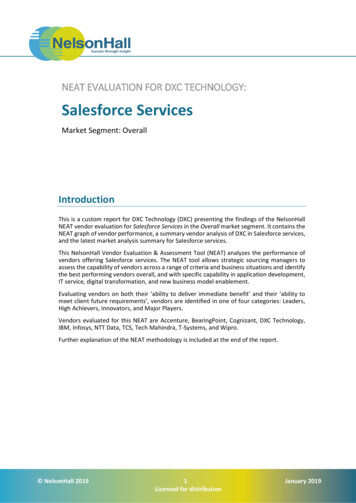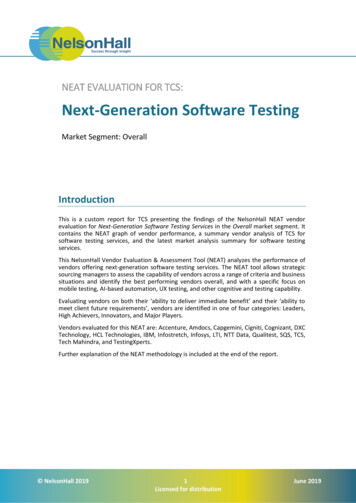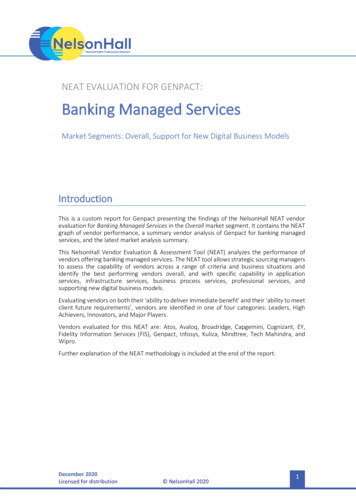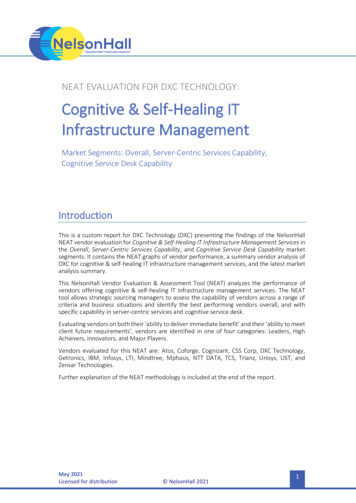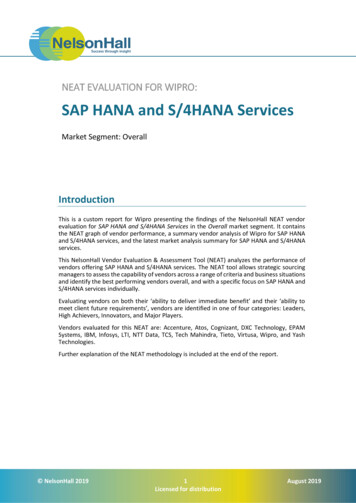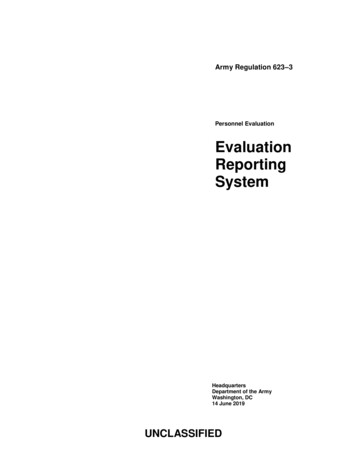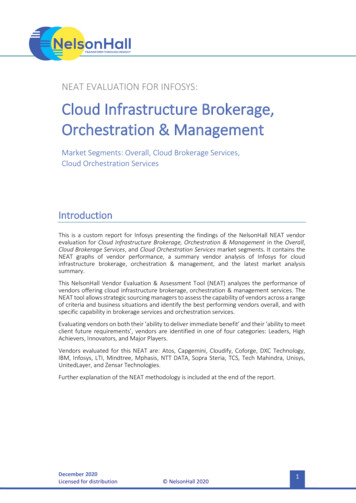
Transcription
NEAT EVALUATION FOR INFOSYS:Cloud Infrastructure Brokerage,Orchestration & ManagementMarket Segments: Overall, Cloud Brokerage Services,Cloud Orchestration ServicesIntroductionThis is a custom report for Infosys presenting the findings of the NelsonHall NEAT vendorevaluation for Cloud Infrastructure Brokerage, Orchestration & Management in the Overall,Cloud Brokerage Services, and Cloud Orchestration Services market segments. It contains theNEAT graphs of vendor performance, a summary vendor analysis of Infosys for cloudinfrastructure brokerage, orchestration & management, and the latest market analysissummary.This NelsonHall Vendor Evaluation & Assessment Tool (NEAT) analyzes the performance ofvendors offering cloud infrastructure brokerage, orchestration & management services. TheNEAT tool allows strategic sourcing managers to assess the capability of vendors across a rangeof criteria and business situations and identify the best performing vendors overall, and withspecific capability in brokerage services and orchestration services.Evaluating vendors on both their ‘ability to deliver immediate benefit’ and their ‘ability to meetclient future requirements’, vendors are identified in one of four categories: Leaders, HighAchievers, Innovators, and Major Players.Vendors evaluated for this NEAT are: Atos, Capgemini, Cloudify, Coforge, DXC Technology,IBM, Infosys, LTI, Mindtree, Mphasis, NTT DATA, Sopra Steria, TCS, Tech Mahindra, Unisys,UnitedLayer, and Zensar Technologies.Further explanation of the NEAT methodology is included at the end of the report. NelsonHall 2020December 2020Licensed for distribution1 NelsonHall 2020Licensed for distributionMarch 20201
NEAT Evaluation for Infosys: Cloud Infrastructure Brokerage, Orchestration & ManagementNEAT Evaluation: Cloud Infrastructure Brokerage,Orchestration & Management (Overall)NelsonHall has identified Infosys as a Leader in the Overall market segment, as shown in theNEAT graph. This market segment reflects Infosys’ overall ability to meet future clientrequirements as well as delivering immediate benefits to its cloud infrastructure brokerage,orchestration & management clients.Leaders are vendors that exhibit both a high capability relative to their peers to deliverimmediate benefit and a high capability relative to their peers to meet future clientrequirements.Buy-side organizations can access the Cloud Infrastructure Brokerage, Orchestration &Management NEAT tool (Overall) here.December 2020Licensed for distribution NelsonHall 20202
NEAT Evaluation for Infosys: Cloud Infrastructure Brokerage, Orchestration & ManagementNEAT Evaluation: Cloud Infrastructure Brokerage,Orchestration & Management(Cloud Brokerage Services)NelsonHall has identified Infosys as a Leader in the Cloud Brokerage Services market segment,as shown in the NEAT graph. This market segment reflects Infosys’ ability to meet future clientrequirements as well as delivering immediate benefits to its cloud infrastructure brokerage,orchestration & management clients with a specific focus on brokerage services.Buy-side organizations can access the Cloud Infrastructure Brokerage, Orchestration &Management NEAT tool (Cloud Brokerage Services) here.December 2020Licensed for distribution NelsonHall 20203
NEAT Evaluation for Infosys: Cloud Infrastructure Brokerage, Orchestration & ManagementNEAT Evaluation: Cloud Infrastructure Brokerage,Orchestration & Management(Cloud Orchestration Services)NelsonHall has identified Infosys as a Leader in the Cloud Orchestration Services marketsegment, as shown in the NEAT graph. This market segment reflects Infosys’ ability to meetfuture client requirements as well as delivering immediate benefits to its cloud infrastructurebrokerage, orchestration & management clients with a specific focus on cloud orchestrationservices.Buy-side organizations can access the Cloud Infrastructure Brokerage, Orchestration &Management NEAT tool (Cloud Orchestration Services) here.December 2020Licensed for distribution NelsonHall 20204
NEAT Evaluation for Infosys: Cloud Infrastructure Brokerage, Orchestration & ManagementVendor Analysis Summary for InfosysOverviewThrough Live Enterprise, Infosys seeks to drive rapid transformation through an automatedfirst, integrated operating model. Infosys is focused on four key transformation levers: Elevated end-user experience: how Infosys can improve service quality Enhanced monitoring & visibility: capturing enterprise telemetry and being able to presentin a way that will improve visibility and transferability within the enterprise and mine datafor future use Self-healing ecosystems: constructs around deriving insights from the data and then usingthe insights to drive autonomous operations across the entire IT operations stack Faster time to market: a context-aware, cloud-agnostic brokerage engine (for anywhere,anytime environments). Infosys has a generic blueprint for hybrid cloud orchestration,brokerage, and governance. It can de-couple from platforms itself and build at scale andspeed an enterprise hybrid cloud management platform and brokerage capabilities acrossa multi-cloud landscape. The entire lifecycle of cloud resources is managed through aplatform-first approach.Infosys provides cloud infrastructure brokerage, orchestration, and management servicesthrough Infosys Cobalt. This includes a set of IP (Polycloud Platform (upgraded version of IIMS),NIA, Edge Suite, Wingspan, and ESM Café), third-party services, solutions, and platforms toaccelerate enterprises’ cloud journey. It also includes 14k cloud assets and 200 industry cloudsolution blueprints.Infosys is adopting SRE to transform operations leveraging tools, including Polycloud, foradvanced observability and automation. It also takes an agile approach to cloud deliveryutilizing Kanban dashboards to keep track of progress and, in the initial planning and executionphase with a client (1-2 months), will seek to build out an automation backlog. It will thendeliver user stories in short 4-5-week sprints to define use cases and enable the immediaterealization of benefits (i.e., from automation and AI-ops engine). It further provides ongoingsupport and automation use case monitoring and performance reporting, and automationplatform health monitoring.Infosys has a number of tenets it focuses on to drive multi-cloud adoption regardless ofplatform. These include bringing a de-coupled team structure across infrastructure, DevOps,and middleware into a single team to manage everything as code. It seeks to empowerdevelopers and business users to build their own environments via self-service to consumethrough their DevOps pipeline. In addition to providing empowerment, it also ensures allenterprise standards and governance are baked in to keep tabs on consumption patterns, cost,etc. Through innovation, it provides the ability to support and onboard multiple services asthey come in from the hyperscalers (AWS, Azure, and GCP). Here, Infosys has a framework toanalyze early pilot programs and assess for enterprise readiness, onboard them, and makeavailable as plug-ins to its platforms and solutions.Through smart brokerage, it provides the ability for comparison of IaaS and PaaS acrossdifferent clouds, and forecasting to see what costs are across clouds and a recommendationengine to ensure best-fit cloud for requirements. This has been matured recently through itsPolycloud Platform. Infosys is also focused on agile and collaboration to provide the ability togain rapid insights as provisioning is going on. It seeks to drive greater collaboration betweeninfrastructure and developer teams as they are building out environments.December 2020Licensed for distribution NelsonHall 20205
NEAT Evaluation for Infosys: Cloud Infrastructure Brokerage, Orchestration & ManagementAnother key focus area through the Polycloud Platform has been efficient operations, as SREand the ability to ingest large volumes of telemetry, logs, and data across different layers ofthe application stack starting from load balancers down to underlying networks, storage,underlying datacenter telemetry, and service mesh telemetry. This is pushed into a big dataengine with real-time analytics running on top to search for anomalies, or issues, events, anderror logs that can go into its AI-Ops engine. Infosys ensures services are delivered inconformance with ITILv3 and enterprise standards, including service request management,change management, and how it manages the state of CI and analyzes data to ensurecontinuous feedback to enable efficient operations.Through Infosys’ blueprint for hybrid cloud orchestration, brokerage and governance, it utilizesa number of cloud providers across IaaS (VMware, OpenStack, Hyper-V, and OVM), IaaS publiccloud (AWS, Azure, GCP), PaaS (Azure PaaS, AWS Outpost, Google Anthos) and containers (K8s,Istio, Envoy, K3s, Docker, and LxD) as its resource layer. These partnerships enable it to providean option for clients to have an enterprise stack that is supported by enterprise technologyproviders and an open stack that is more geared toward cloud-native technologies in thehyperscaler space. It seeks to enable SRE as the default to manage across what it classes asthree horizons. Horizon one is cloud-native, horizon two where a client is subscribing to cloudcommodity services, and horizon three is a mix. It seeks to provide the tooling andinstrumentation to run these environments in a highly automated way through Polycloud andthe talent and skills required to run these, including utilization of its Wingspan trainingplatform.Infosys looks to build a platform that integrates with everything across the enterprise toolsetto provide a ‘single pane of glass’ solution that brings in elements of governance, security,operations, monitoring, etc., in a unified manner with automation baked in. It is presented asa single unified interface for end-users that abstracts the underlying management plane andinfrastructure to drive a seamless experience with an AWS or Azure-like feel. It enables endusers to pick from catalog items based on their specific requirements.Infosys takes a three-phased approach to end-to-end cloud resource lifecycle management,including orchestration, brokerage, governance, and management in a Polycloud ecosystemwhich includes: Design & Publish: cloud architects and cloud administrators build infrastructure blueprintsas part of the Polycloud ecosystem and publish these into a catalog. It is agnostic to anunderlying cloud platform and provides the ability to stitch together different offeringsinto a single blueprint for consumption and publish to entitled end-users Choose & Subscribe: the entitled end-users, including developers, DevOps teams, SRE, andinfrastructure administrators who can consume these services either via the portal, orServiceNow front-end if required, or via a set of APIs, or through CI/CD pipelines. Thistriggers an orchestration workflow that requires just a single click on request for services,integrating with all different systems to provide an enterprise-hardened service. It includesITSM, monitoring, security, all encompassed within. Infosys treats all services as asubscription, and in order to keep consumption low, it provides a default lease. Here, forall services, it forces users to continually extend the lease, or it will terminate resourcesthat are not required anymore (i.e., when applications are end-of-life but continue to runfor many years) Administer & Operate: the end-user has the ability to manage their ecosystemenvironments through a single pane of glass view, which includes the ability to administerand extend leases, look at telemetry to see issues, scale-up, scale-down and scale-outpolicies, and modify back-up policies. This can be done either via a console or by SREengineers programmatically.December 2020Licensed for distribution NelsonHall 20206
NEAT Evaluation for Infosys: Cloud Infrastructure Brokerage, Orchestration & ManagementFinancialsInfosys' CY 2019 revenues were 12.6bn. NelsonHall estimates that 40% of this is associatedwith digital services. NelsonHall further estimates that a significant part of these revenuesrelates to cloud services.NelsonHall estimates the geographical breakdown of Infosys' cloud infrastructure brokerage,orchestration, and management services revenues in CY 2019 to be: North America: 60% EMEA: 25% Rest of World: 15%.NelsonHall estimates the vertical industry breakdown of Infosys' cloud infrastructurebrokerage, orchestration, and management services revenues in CY 2019 to be: Financial services: 32% Retail: 15% Communication: 13% EURS: 12% Manufacturing: 9% High-Tech: 9% Life sciences: 7% Other: 3%.Strengths Significant IP (Polycloud Platform, NIA, Edge Suite, Wingspan, and ESM Café); and strategicinvestment in the cloud as a key focus area for Infosys Infosys Cobalt Cloud Community and dedicated resources to curate assets Cobalt Labs at its global digital centers to enable clients to rapidly prototype and co-createnew cloud-first solutions Cloud assets (14k) and 200 industry cloud solution blueprints Comprehensive partner ecosystem in support of Polycloud Platform and automationframework Partnerships with academic institutions to seed skilled workforce Significant investment in the training of personnel.December 2020Licensed for distribution NelsonHall 20207
NEAT Evaluation for Infosys: Cloud Infrastructure Brokerage, Orchestration & ManagementChallenges The transition from IIMS to Polycloud Platform for managed services clients will take time Significant reliance on the North American market Continuing to increase onshore presence in EMEA Ramping cloud certifications Scaling consulting & advisory capabilities.Strategic DirectionInfosys is looking to expand its cloud infrastructure brokerage, orchestration, andmanagement services capabilities through the following initiatives over the next 12-18months:Investments in IP and accelerators Continued investment in support of Infosys Cobalt Cloud Community and dedicatedresources curating assets from the cloud community; and expanding cloud assets andindustry cloud solution blueprints Investing in capabilities in support of containerization and PaaS as an industry standard,with capabilities across manage, observe, and administer, utilizing Kubernetes andOpenShift platforms and within the constraints of cloud brokerage, orchestration andgovernance Evolving Polycloud Platform roadmap to shift from PaaS to cloud-native with an increasingemphasis on SRE and observability; and XaaS support across a Polycloud ecosystem Investing in smart brokerage engine capability in Polycloud Platform Enabling Infra as code utilizing Ansible and Terraform DevSecOps: investing in capabilities in support of cloud-native apps (microservices andserverless); and investments in site reliability engineering (SRE) capabilities andobservability.Investment in Expand Localization initiative in support of cognitive and AI services Enhancing consulting, advisory, and design thinking capabilities through utilization ofWONGDOODY and Brilliant Basics acquisitions to support IT transformation initiatives Expanding digital studios, Cobalt Labs, and innovation hubs globally (to provide localizedsupport), and investing in digital skills, and in partnerships with academia to better enableclients’ IT infrastructure and cloud transformation roadmaps and initiatives.Digital reskilling initiativesInfosys is investing in digital skills training to enhance automation capabilities, with initiativesincluding: Expanding partnerships with individual universities to curate curricula for Infosysemployees in areas such as ML, autonomous technologies, blockchain, design thinking (thelatter, e.g., at Rhode Island School of Design)December 2020Licensed for distribution NelsonHall 20208
NEAT Evaluation for Infosys: Cloud Infrastructure Brokerage, Orchestration & Management Investing in training programs focusing on competencies, including UX, cloud, big data,digital offerings, and core technology and computer science skills; and utilizing Wingspanin support of cloud-specific training initiatives.OutlookInfosys has recently launched its Cobalt Cloud Community to drive grassroots level innovationon cloud platforms. It aims to help enterprises redesign from the core and build cloud-firstcapabilities across multi-cloud utilizing IaaS, PaaS, and SaaS. Infosys operates a marketplacemodel through its Infosys Cobalt Store, providing access to all capabilities and enabling clientsto add their assets to solve specific business problems. It has a dedicated team ( 50 FTEs)curating assets from the cloud community, and we expect Infosys will ramp these resourcesas the cloud community expands.Infosys provides extensive IP in support of end-to-end cloud services, including InfosysInfrastructure Management Suite (IIMS), ESM Café (ServiceNow), NIA, Edge Suite, andWingspan learning platform. However, it has made a significant investment in its InfosysPolycloud Platform, which effectively enables multiple cloud providers (e.g., AWS, Azure, GCP)and private cloud (e.g., VMware) to operate within an enterprise concurrently with portabilityacross cloud providers to enable an enterprise to be cloud-agnostic while transitioning to acloud-native organization. Infosys Polycloud supports multiple cloud services across IaaS, PaaS,and CaaS and builds entire application blueprints in a templatized manner like Terraform orCloudFormation but abstracted from the underlying cloud. All clients currently on IIMS will beupgraded to Polycloud Platform, although this transition will take time.Infosys has extensive ecosystem partnerships across IaaS, PaaS, SaaS, and CaaS to providemultiple options to clients. We expect Infosys will increase its partnerships across Polycloud inparticular in support of cloud-native services and capabilities. From a cloud managementperspective and through its enterprise cloud store, it effectively looks to provide everything‘as a service’. A key investment includes its smart brokerage engine, which can makerecommendations and automatically provision a best-fit cloud based on client requirementsand criteria. It is further investing in its recommendation engine in order to enact real-timebrokerage, which will provide additional differentiation for Infosys in this area.Polycloud also provides API-driven architecture for IaC to expedite SDLC and can also automateand integrate with the client's CI/CD pipelines. In addition, through intelligent eventmanagement (AI-Ops), it aims to move clients from a DevOps to No-Ops construct. Infosys istaking an SRE-enabled approach as the default to manage end-to-end cloud services in a highlyautomated way through Polycloud. We expect it will continue to expand its SRE resources insupport of its cloud approach. It is also investing in wider talent and skills to provide supportthrough the utilization of its Wingspan platform. Infosys will need to expedite its training andits cloud certifications in support of clients’ ongoing cloud transformation initiatives.From an observability perspective, Infosys is investing in a number of OpenSource monitoringsystems as clients move to a container-first approach to provide monitoring and observabilityfor this technology stack. This will provide good opportunities for Infosys, as these services arestill relatively nascent. Within CaaS, Polycloud enables entire Kubernetes environments to beprovisioned irrespective of cloud on-demand, providing the ability to build applications andtemplatized applications with pre-built reference architecture baked into templates on top ofindividual blueprints. We expect Infosys will increase its capabilities in this area.As clients increasingly look for help in managing hybrid cloud environments from a costperspective, Infosys has developed billing policies across a number of services, includingsecurity, monitoring, back-up, and
Market Segments: Overall, Cloud Brokerage Services, Cloud Orchestration Services Introduction This is a custom report for Infosys presenting the findings of the NelsonHall NEAT vendor evaluation for Cloud Infrastructure Brokerage, Orchestration & Management in the Overall, Cloud Broker
